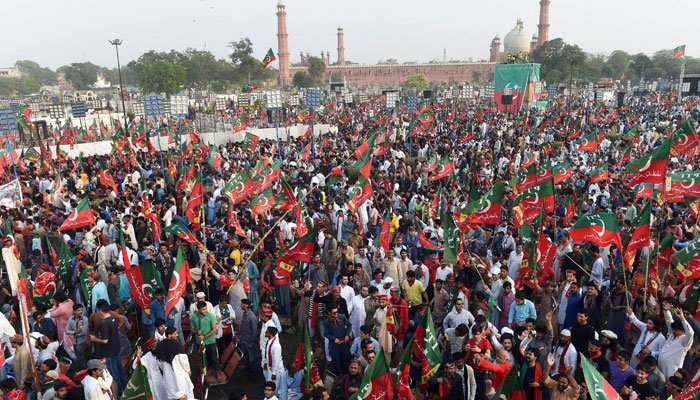Power politics has once again shown us its ugly face in the last few days. Power politics is all about power, privilege, position and money with no room for ideology. Such politics promotes political corruption and opportunism. That is what we are witnessing right now. The PTI wants to retain power through any means and the Opposition wants to oust it via any means.
Many lawmakers who contested the 2018 general elections on the PTI ticket have decided to ditch the ruling party. It may be remembered that the PTI leadership was happy when many electables ditched the PML-N and PPP to join the PTI before the 2018 elections. The current ruling party had at the time made all sorts of compromises to gain power. And now Opposition parties are doing the same, relying on the same people to oust the PTI government that had brought the PTI to power.
We need principled and ideology-based politics to strengthen democracy and politics in Pakistan. Political opportunism and corruption will further erode the credibility of the democratic process.
While it was the beneficiary of defections in 2018, the PTI is now crying foul and accusing the Opposition of indulging in horse-trading and corrupt practices. Unfortunately, the PTI failed to establish healthy democratic traditions and culture in the country. And now Opposition parties are encouraging defections from within the PTI.
Politics of defections is not going to strengthen democracy, democratic norms and the political culture. Such undemocratic practices and traditions not only undermine parliamentary democracy but also taint the public image of elected representatives. Both the PPP and PML-N have suffered in the past due to the defections. But it seems they are not ready to learn lessons from the past.
The PTI is facing a revolt as nearly two dozen members of the National Assembly have declared publicly to side with the Opposition during the vote of no-confidence. Different media reports are indicating that more lawmakers are ready to join hands with the Opposition parties.
The PTI allies are closely watching the developments to make their own decision. It seems that Prime Minister Imran Khan is in deep trouble. Under the present circumstances, it is not hard to predict which side allies are going to take.
Political defections are not a new phenomenon in Pakistani politics. We have seen in the past how parliamentarians have changed their political loyalty overnight to serve the ‘larger national interest’ – or their suddenly awakened conscience.
Generally, the season of political defections starts a few months before the general elections. But this time it started a bit earlier. Many electables change political loyalty before almost every election. These electables have no permanent commitment to any political party.
The PTI government is blaming the Opposition for these defections, alleging that they have been offered money and other incentives for their votes. Such allegations not only tarnish the image of elected representatives but also raise questions on the integrity, legitimacy and transparency of the electoral process and politics.
The whole debate around the allegations of horse-trading and vote selling in the no-confidence move has created the impression that the use of money in the electoral process is confined just to the elections. However, this is a much more serious issue. Wealth is not just used during elections but also to enter into politics. The fact is that electoral politics, whether it is at the union council level or within national and provincial constituencies, is plagued by money, influence and power.
The tragedy is that all major political parties indulge in the same practice to lure electables from other parties to strengthen their position at the expense of others. Can political parties justify the presence of so many parliamentarians within their ranks who have contested every election on the ticket of a different party?
There are many parliamentarians who have never contested two elections from the platform of a single party. And yet every party wants to embrace them. It is surprising to see leaders who support and encourage defections in other parties, but cry foul when their own do the same.
What else can we expect from a political system that is based on money, power and patronage? When politics is not based on ideologies, principles and a democratic spirit, it can only produce a culture of political corruption, rigging and horse-trading. The cleansing of a political system is the responsibility of the political leadership. But the leadership of today is not playing its role in this regard.
Pakistan’s democracy is still an elitist democracy. People’s democracy — or rather a participatory democracy — is still a distant dream for the people.
The overwhelming majority of parliamentarians belong to the elite. And the results of every election simply reflect the fact that parliamentary politics and the political system are controlled by the elite and privileged while political activists who belong to the middle and working classes have consciously been kept out of this system. The working classes and the poor have been alienated from this political system.
The writer is a freelance journalist.
Originally published in The News

 Business2 days ago
Business2 days ago
 Business2 days ago
Business2 days ago
 Business2 days ago
Business2 days ago
 Latest News2 days ago
Latest News2 days ago
 Business2 days ago
Business2 days ago
 Latest News2 days ago
Latest News2 days ago
 Latest News2 days ago
Latest News2 days ago
 Business2 days ago
Business2 days ago
















